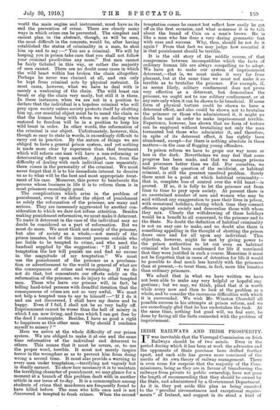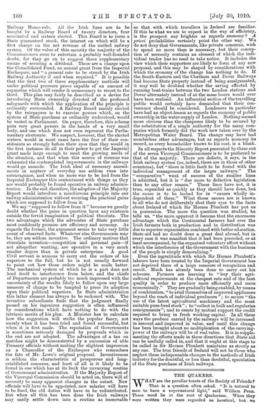IRISH RAILWAYS AND IRISH PROSPERITY.
IT was inevitable that the Viceregal Commission on Irish Railways should be of two minds. Even in the period during which it has been at work the advocates and the opponents of State purchase have drifted further apart, and each side has grown more convinced of the merits of its own theory of railway management. There is even room for surprise that the majority of the Com- missioners, being as they are in favour of transferring the railways from private to public ownership, have not gone the length of recommending that they should be owned by the State, and administered by a Government Department. As it is, they put aside this plan as being unsuited to the " peculiar circumstances and exceptional require- ments " of Ireland, and suggest in its stead a kind of Railway Home-rule. All the Irish lines are to be bought by a Railway Board of twenty directors, four nominated and sixteen elected. This Board is to issue a State guaranteed stock, the interest on which will be a first charge on the net revenue of the unified railway system. Of the value of this security the majority of the Commissioners seem to entertain a probably well-founded doubt, for they go on to suggest three supplementary means of securing a dividend. These are a charge upon the Consolidated Fund, an annual grant from the Imperial Exchequer, and " a general rate to be struck by the Irish Railway Authority if and when required." It is possible that the first two of these supplementary methods will under political pressure prove capable of an amount of expansion which will render it unnecessary to resort to the third. This plan may fairly be described as a device for introducing State ownership divested of the professed safeguards with which the application of the principle is ordinarily surrounded. A Railway Board mainly elected by the ratepayers is to exercise powers which, on the system of State purchase as ordinarily understood, would be vested in Parliament. On paper, therefore, this scheme puts very great powers in the hands of a very small body, and one which does not even represent the Parlia- mentary electorate. We suspect, however, that the elected sixteen would in most cases have the fear of their con- stituents so strongly before their eyes that they would in the first instance do all in their power to get the Imperial ' grant made large enough to meet the growing needs of the situation, and that when this source of revenue was exhausted the contemplated improvements in the railways would go unmade. The Irish ideal of necessary amend- ments in matters of everyday use seldom runs into extravagance, and when no more was to be had from the Imperial Exchequer this contentment with things as they are would probably be found operative in railway adminis- tration. In the end, therefore, the adoption of the Majority Report would introduce a mischievous principle into our railway administration without securing the practical gains which are supposed to follow from it.
We say " supposed to follow from it" because we greatly doubt whether the gains in question have any existence outside the fervid imagination of political theorists. The two advantages which the advocates of State purchase most confidently promise are efficiency and economy. As regards the former, the argument seems to take very little count of observed facts. Whatever else Governments may be, they are seldom inventive. The ordinary motives that stimulate invention—competition and personal gain—if not altogether wanting, are operative in a very much smaller degree than in private enterprises. A good Civil servant is anxious to carry out the orders of his superiors to the full, but he is not usually forward to point out how these orders might be made better. The mechanical system of which he is a part does not lend itself to interference from below, and the chiefs of Departments are probably too much impressed with the uncertainty of the results likely to follow upon any large measure of change to be tempted to press its adoption upon their political superiors. In State administration this latter element has always to be reckoned with. The inventive subordinate finds that the judgment finally passed on his ingenious suggestion is often influenced by considerations which have nothing to do with the intrinsic merits of his plan. A Minister has to calculate how the suggestion will strike the popular fancy, not merely when it has been tried and found successful, but when it is first made. The reputation of Governments is sometimes seriously damaged by proposals which in the end are not adopted. The advantages of a tax on matches might be demonstrated by a succession of able Treasury officials without making the slightest impression on a Chancellor of the Exchequer who remembers the fate of Mr. Lowe's original proposal. Inventiveness is seldom the characteristic of prosperous and long- established concerns, and least of all is it likely to be found in one which has at its back the unvarying routine of Government administration If the Majority Report of the Viceregal Commission should be acted on, there will of necessity be many apparent changes in the outset. New officials will have to be appointed, new salaries will have to be fixed, the old duties will have to be redistributed.
But when all this has been done the Irish railways may easily settle down into a routine as immovable as that with which travellers in Ireland are familiar If this be what we are to expect in the way of efficiency, is the prospect any brighter as regards economy ? A priori probabilities certainly point the other way. We do not deny that Governments, like private concerns, wish to spend no more than is necessary, but their concep- tion of necessity contains an element of which the indi- vidual trader has no need to take notice. It includes the view which their supporters are likely to form of any new proposal, and this may be shaped by considerations with which the economy of the change has nothing to do. If the South-Eastern and the Chatham and Dover Railways had become State property instead of being amalgamated, it may well be doubted whether the saving effected by running boat-trains between the two London stations and Dover alternately instead of at the same hours would ever have been realised. An influential section of the travelling public would certainly have demanded that their con- venience should be considered. Londoners in particular have had an object-lesson as regards the economy of public ownership in the water-supply of London. Nothing seemed more obvious than the cheapness likely to be secured by the substitution of a single authority for the many com- panies which formerly did the work now taken over by the Metropolitan Water Board. The change may have bad numberless other advantages, but as regards economy its record, as every householder knows to his cost, is a blank.
In all respects the Minority Report presented by three out of the seven Viceregal Commissioners is to be preferred to that of the majority. There are defects, it says, in the Irish railway system (as, indeed, there are in those of other countries), but "there is little fault to be found with the individual management of the larger railways." The " comparative " want of success of the smaller lines is admitted, but it is " due more to defective legislation than to any other reason." These lines have not, it is true, expanded as quickly as they should have done, but the cause is to be looked for in " causes wholly in- dependent of them." What those causes are is known to all who do not deliberately shut their eyes to the facts about Ireland of which Sir Horace Plunkett has put us in possession. The more the question was studied, he tells us, " the more apparent it became that the enormous advantage which the Continental farmers had over the Irish farmers both in production and in distribution was due to superior organisation combined with better education. State aid had no doubt done a great deal abroad, but in every case it was manifest that it had been preceded, or at least accompanied, by the organised voluntary effort without which the interference of the Government with the business of the people is simply demoralising."
Even the ingratitude with which Sir Horace Plunkett's labours have been treated by the Imperial Government has not deprived them of a large measure of recognition and result. Much has already been done to carry out his schemes. Farmers are learning to " buy their agri- cultural requirements at the cheapest rate and of the best quality in order to produce more efficiently and more economically." They_are gradually being enabled, by means of combination, " to avail themselves of improved appliances beyond the reach of individual producers " ; to secure " the use of the latest agricultural machinery and the most suitable pure-bred stock" ; to "collect in bulk and regularise consignments"; and to create by mutual support the credit required to bring in fresh working capital. In all these ways the produce carried by the railways will be increased in amount and improved in value, and until this change has been brought about no multiplication of the carrying- power of the railways will be of real value. It is in supple- menting the efforts made in these directions that State aid can be usefully called in, and that it ought at this stage to be called in Sir Horace Plunkett maintains as stoutly as any one. The true friends of Ireland will not be those who neglect these indispensable changes in the methods of Irish industry for the doubtful, or less than doubtful, speculation of the State purchase of Irish railways.







































 Previous page
Previous page